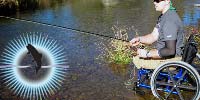Healing Waters- Cpl Neil Frustaglio

 4:42
Barrett Golding
4:42
Barrett Golding
Wounded warriers get their wheelchairs wet fly-fishing.
Broadcast: Mar 21 2007 on NPR Day to DaySeries: Project Healing Waters Subjects: War, Environment, Health
Casting a Line, Making a Recovery: Neil Frustaglio
March 21, 2007 from Day to Day
MADELEINE BRAND, host: This is DAY TO DAY. I'm Madeleine Brand.
JOHN YDSTIE, host: And I'm John Ydstie. Coming up, we'll hear from Representative John Dingell. Once a skeptic of global warming, he's invited Al Gore and industry leaders to testify to his congressional committee today. Representative JOHN DINGELL (Democrat, Michigan): What we're trying to do is to come forward with legislation, as speedily as we can, which will see to it that the concerns and the needs of every part of this country are dealt with. BRAND: But first... Corporal NEIL FRUSTAGLIO (United States Marine Corp): I'm Neil Frustaglio, corporal, infantry mortar man. I'm just one of the normal guys out there running through the streets. BRAND: Neil Frustaglio lost both his legs while patrolling the streets of Iraq. He has spent countless hours recovering from his injuries. Part of that recovery has been out doors, fly-fishing with a group called Project Healing Waters. The goal of the volunteer fishing guides is to help vets recover both physically and mentally. Unidentified Man #1: See that stick out in the water? Cast just to this end of the stick and let it sweep back a little bit further and down. Cpl. FRUSTAGLIO: Oh, I got a few. They were mostly 15 to probably about 18 inch rainbow. All nice fish, good colors. I mean, a few of them had a pretty decent fight to them. I don't know how many people have put their wheelchairs in the water before just to catch fish, but I guess it worked for me. So, hey, whatever. Unidentified Man #1: All right. Try that. I know it's small, but hopefully it'll catch a big fish. Cpl. FRUSTAGLIO: I went to Iraq with the 3rd Battalion 7th Marines. And then I was in Ramadi until I got hurt. It was like a lot of guys - IED blasts. It was a large IED buried under some trash alongside the road. It was at night, actually, so there was no way at all we were actually going to see it. I was on foot. The blast came under the truck that were standing next to and caught me in the legs. There were seven of us injured. Five of us are amputees. We have one leg in between the five of us. The others were just burn injuries and one KIA. He was one of my Marines. And I knew from the time of the blast that my legs were in trouble. If I lived there was going to be some serious problems. A Navy corpsman, who was in my platoon, he lost a leg about a month and a half beforehand. And I was the one who found him and I put the tourniquet on his leg and carried him to a vehicle to get him evacued. So I knew what could happen. And when I got hit, it really didn't surprise me when I woke up and found out, you know, how badly injured I was. You know, which is kind of odd to say, you know, for someone who lost their legs. But... It was hard. I mean, the first three weeks were really rough. But once I was able to get around and get into a wheelchair and start doing things on my own again, it got a lot easier. And I mean, there's still days where you go, oh, what the heck am I going to do for the rest of my life? But I have a pretty good plan set up and just gotten married in September and I actually want to be like a high school science biology teacher. I want to go to school and start over where I ended my education four plus years ago now. But there is going to be an influx of, you know, military amputees going out into the workforce and going to college. And, I mean, there's already a lot of amputees out there. You know, I can tell when somebody's walking on a prosthetic leg. I've been around amputees for the last year. I don't think it will ever be a common thing. At least I hope not, but already it's happening. And in the next few years there's going to be more out there. So, you know, just start over in life and see what happens. Unidentified Man #1: That's the spot right there. Unidentified Man #2: Right on that ledge, Neil. Unidentified Man #1: Right over the ledge. There's a hundred fish right here. (Unintelligible) right underneath that stuff there. Cpl. FRUSTAGLIO: (Unintelligible). (Soundbite of music) BRAND: Frustaglio's story was produced by Barrett Golding of Hearingvoices.com. Our series on Project Healing Waters continues tomorrow. To hear all the stories in our series, visit our Web site npr.org. (Soundbite of music) BRAND: More coming up on DAY TO DAY from NPR News.
